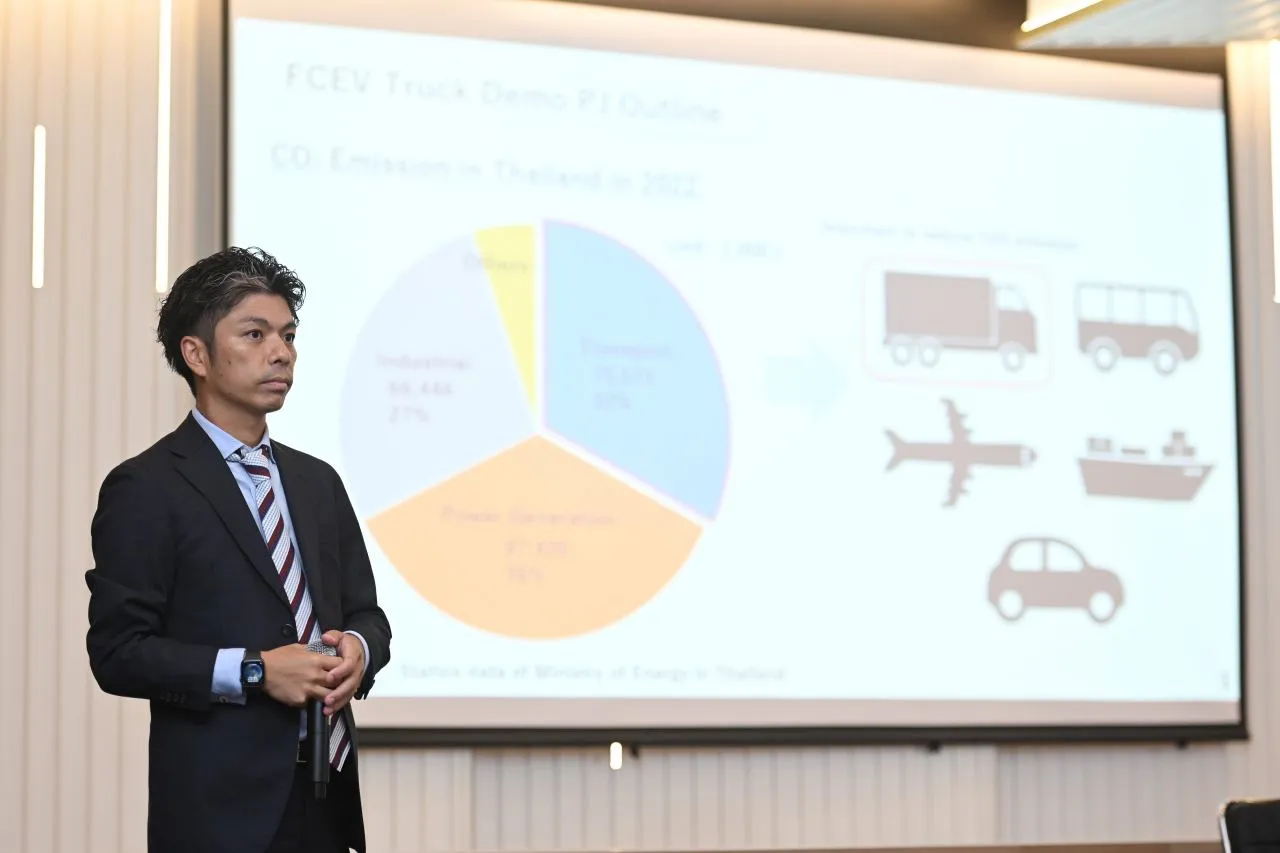Toyota, Tsusho and DENSO are collaborating with Next Point to develop hydrogen-powered transportation or commercial vehicles. We expect to see it in the fourth quarter of 2024.
Mr. Kanis Srivajiraprabha, CEO of Nex Point Public Company Limited or NEX, said, We have cooperated with Toyota Tsusho Corporation Limited or TOYOTA TSUSHO CORPORATION, Toyota Tsusho (Thailand) Limited, and DEN Group of Companies, to produce series of hydrogen-powered commercial vehicles.
We see it as another option to respond to carbon neutrality in accordance with government policy. Which attempts to push and support the widespread use of commercial electric vehicles, both electric passenger buses and electric trucks, as companies or legal partnerships can deduct expenses in their tax calculations twice in the case of purchasing vehicles produced or assembled in the country.
Including pushing government agencies and state institutions to switch to the use of electric vehicles to jointly reduce greenhouse gas emissions and PM2.5 dust, the production of hydrogen-powered commercial electric vehicles is expected. It will definitely be achieved in the fourth quarter of 2024.
For this collaboration all parties including Nex Point, Toyota Tsusho and DENSO were involved in the integrated design of the truck.
– Toyota Tsusho – Responsible for coordinating development projects. Purchasing equipment related to the hydrogen system and cooperating in evaluating the vehicle’s performance
– Denso Information on fuel cell (fuel cell) systems including technical support will be developed and provided. And cooperate in evaluating vehicles
– Next point Responsible for developing automotive production and modification of vehicles that will be used as the basis, including installation and testing of products to meet specified standards.
It is hoped that this project will help increase the potential of the Thai automobile industry. Meet the business needs of entrepreneurs, especially Thai exporters, who face CBAM measures and reduce environmental impacts from the transportation sector. Promote and respond to government policies
However, in the past, Toyota Tsusho and Denso developed a fuel cell system, a device that produces electrical energy directly through an electrochemical process. Without going through the combustion process, it is considered clean energy that does not cause air pollution. It is characterized by higher efficiency than engines that use energy resulting from burning fuel, and it has been used in various energy applications. But in the past it was never used in vehicles produced in Thailand.
Therefore, this project is the first collaborative project in which Nex Point and Toyota Tsusho jointly develop hydrogen-powered electric vehicles. It was produced in Thailand for the first time and is mainly focused on commercial vehicles. Because it can help reduce the larger impact on carbon emissions.
Mr. Kanis added that NEX is currently producing and assembling electric vehicles. Or electric vehicle up to approximately 9,000 vehicles per year, so we still have the capacity to produce enough electric vehicles to meet market demand.
Next Point distributes electric buses. Electric buses, electric trucks, electric pickup trucks, electric trucks, electric tow truck It has sold 5,556 vehicles, of which there are currently 2,757 pending orders, including nearly 1,000 electric passenger buses and more than 1,000 electric trucks, and all the vehicles are expected to be delivered. Required in 2024. There were also 229 electric pickup trucks. Preserved for the car show in December. 66 should be delivered during the first half of 2024.

Mr. Takahiro Arai, General Manager of Automotive Raw Materials and Environmental Economy Division at Toyota Tsusho Co., Ltd., said that this cooperation aims to develop commercial electric vehicle technology. Thailand's first hydrogen power plant
Our goal is for the vehicles produced to be able to operate at equal or higher efficiency than combustion vehicles. It can travel long distances every time to refuel. It reduces pollution emissions and aims to accelerate the production of prototypes for commercial electric vehicles driven by hydrogen energy. It will be completed in the fourth quarter of 2024.
If this cooperation project is successful, said Mr. Jun Kawamura, Director of Energy Solutions Development Department of Denso Corporation Co., Ltd. The developer group plans to expand the size of the project to a large fleet. Increase the potential of the local hydrogen fuel supply chain and reduce the impact on the ecosystem from the transportation sector
We chose to cooperate with NEX because we believe in the potential and stability of NEX as a leader in the commercial electric vehicle manufacturing industry in Thailand. Which has an integrated production and assembly plant for commercial electric vehicles whose production and export is accepted in ASEAN. Most importantly, the company is also listed on the Stock Exchange of Thailand and will use the strengths of TOYOTA TSUSHO DENSO and NEX to combine strengths together.

“Reader. Infuriatingly humble coffee enthusiast. Future teen idol. Tv nerd. Explorer. Organizer. Twitter aficionado. Evil music fanatic.”
